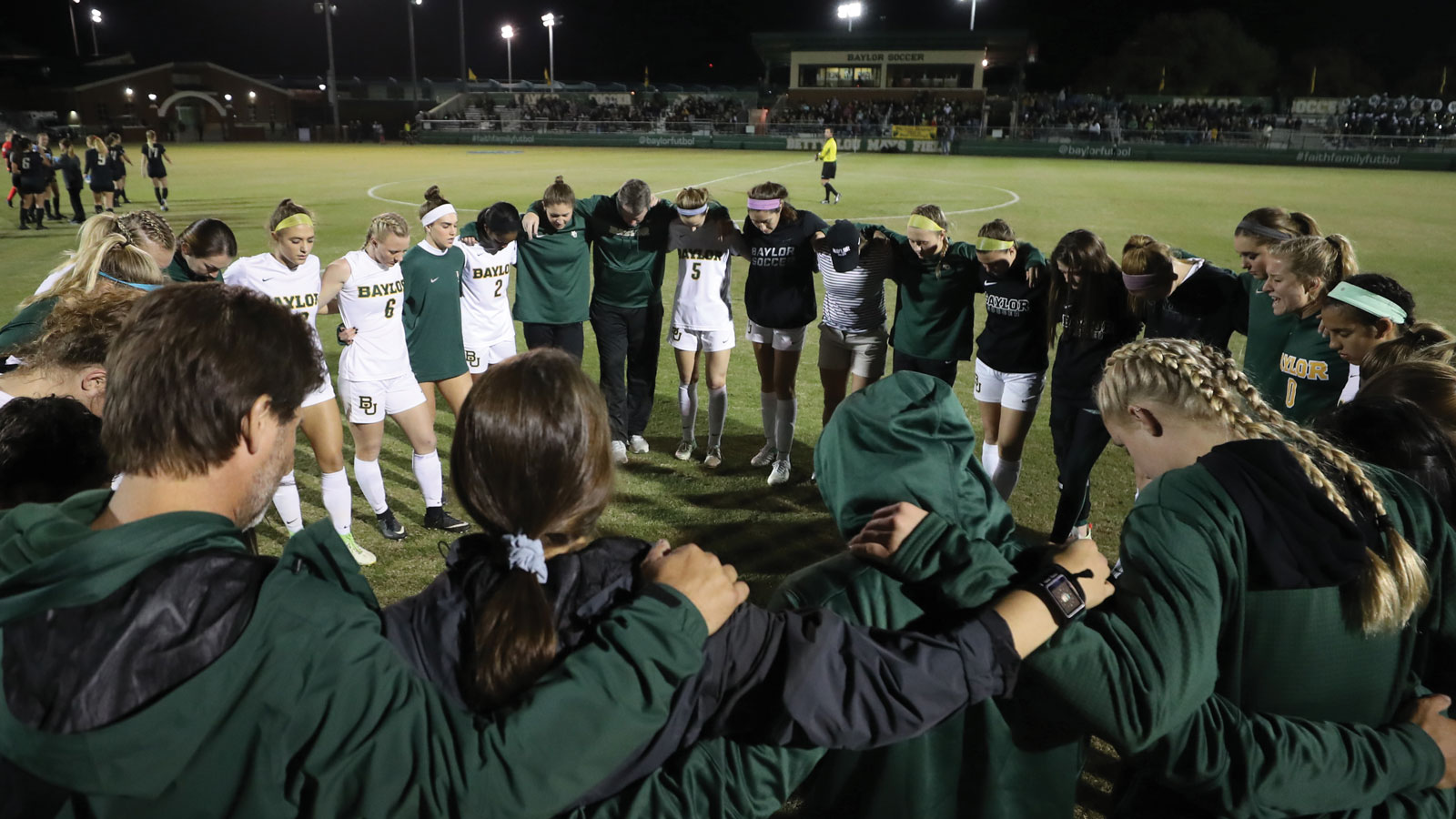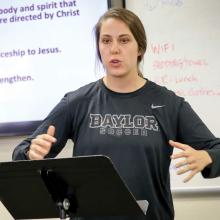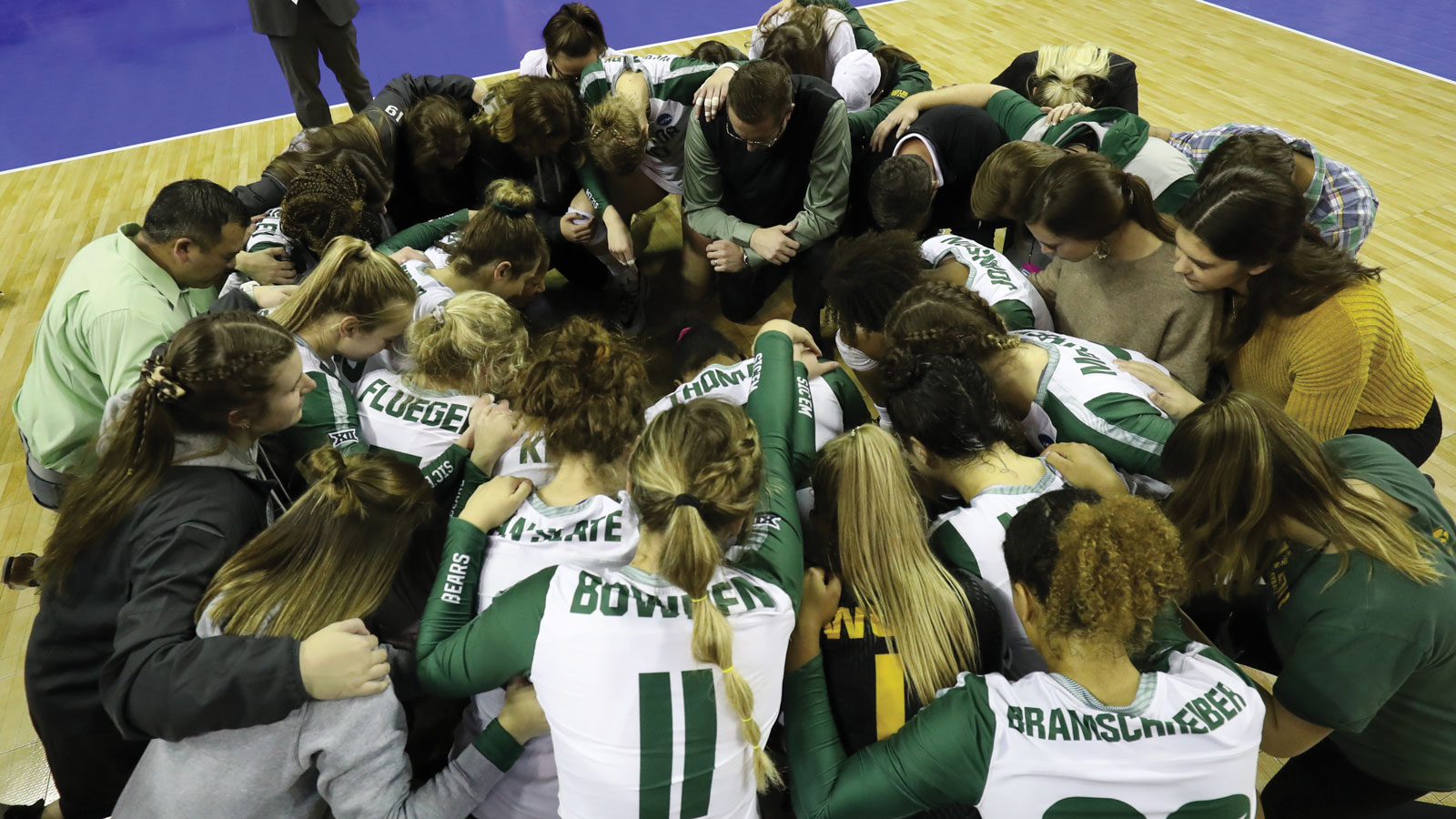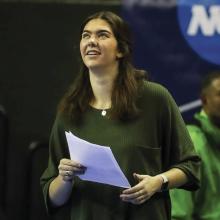Making Spiritual Connections
Truett Seminary students working as chaplains on the Baylor University campus are finding ways to connect with undergraduate students and student-athletes, while also putting their ministry education into practice.
On Campus Chaplains
Take a closer look at two traditional college experiences on Baylor University’s campus — living in residence halls and competing on one of the University’s 19 NCAA Division I athletics teams — and you will often find a unique marker of Truett Seminary’s influence. Truett students serving as resident and sports chaplains are embedded within their respective communities and walk through the challenges and opportunities of daily life with students.
The resident chaplain program works with the Department of Pastoral Care in the Office of Baylor Spiritual Life and Campus Living and Learning. Each resident chaplain lives in an on-campus residential community and provides a ministerial presence for the residents. Similarly, sports chaplains are integral members of the Baylor Athletics teams and provide a needed source of pastoral care to student-athletes.
In the Fishbowl
For resident chaplains, the reality of living under the same roof as the students they serve calls for a commitment to be mindful of that fact and to use that mindfulness to inform their decisions and actions.
“My students see me constantly, whether I am prepared for it or not,” said Elijah Tanner, who serves as the Teal Residential College resident chaplain. “We call it the fishbowl effect, where it feels like you’re always being watched. My life needs to be constantly centered on Christ and the ministry he has called me to because my example is constantly a witness.”
Coursework at Truett may not directly answer the day-to-day challenges of the resident chaplains, but the experiences and questions that a seminary education provides often work through the chaplains to the students they serve.
“I often met with students who had a lot of baggage surrounding their faith and were afraid that asking questions meant they were not being faithful. Truett helped me work through my own anxieties and learn to ask better questions, which I was then able to practice with my students.”
-Katie Stahl
“My Truett professors taught me to ask better questions,” said Katie Stahl, one of the Honors Residential College resident chaplains. “I often met with students who had a lot of baggage surrounding their faith and were afraid that asking questions meant they were not being faithful. Truett helped me work through my own anxieties and learn to ask better questions, which I was then able to practice with my students.”
Stahl has the unique experience of serving the students within the Honors Residential College alongside her husband, Chase Jensen, who is also a resident chaplain.
“To be on a journey of professional growth is a blessing, and to simultaneously have a close companion on that journey who can experience it with you and who can see your journey, as well as share theirs with you, is a gift,” Jensen said. “We brought two very different sets of eyes to the same events, offering a greater wisdom and insight than either of us could have provided alone.”
While complex theological discussions may be commonplace within the halls of Truett Seminary, the reality of the resident chaplain role can look very different. Some days it is walking through crises of faith, providing spiritual guidance to students who are grieving, or meeting with individuals who have violated Baylor’s Student Code of Conduct.
Other days, it looks like an open invitation in the form of a crockpot of tacos and a movie. For Jessica Bird, the resident chaplain for Heritage House in North Village, the weekly open door offering of food, movies, and conversation provide a space of rest and relaxation for her residents — a break from the stress and strain of their academic work.
“While I have been able to have a few really deep and wonderful theological conversations with some interested students, I have found that most residents could not care less about my understanding of the doctrine of soteriology,” Bird said. “They don’t care about my reading list. I have yet to have a conversation with a resident where atonement theory comes up.
“They do, however, care that I know their names. They care that I remember what their majors are or when they have a performance. They care that I get coffee with them. And once that trust has been built, they know that they can knock on my door when the big questions come or the burdens get too heavy.”
Minister and Coach
For sports chaplains, the teams are often smaller than the communities served by resident chaplains, allowing for deeper roots of pastoral connection to grow. However, the pastoral care and presence provided by sports chaplains is similar.
Embedded within the sports programs they are working with, sports chaplains walk through life alongside the student-athletes and coaches, providing a Christ-centered influence in the midst of unique challenges they face on a daily basis.
“It is a privilege to partner with God in spreading his Kingdom through the vehicle of soccer. Soccer is a gift from God played and coached by his grace and for his glory.”
- Elizabeth Perkins
“Sports teams need chaplains for the same reasons that anyone needs a chaplain — these men and women need to be pastorally cared for and challenged to live for Christ in all they do,” said John Maurer, director of sports ministry for Baylor Athletics. “The world of college and professional sports is a world of pressure, expectations, and performance-based acceptance. It is easy for an athlete or coach to become what they do and succumb to the win-at-all-cost mantra so prevalent in this world.”
Most sports chaplains are voluntary positions, with the chaplains offering their services of spiritual guidance and direction to the team.
Elizabeth Perkins served as the volunteer assistant coach for the Baylor women’s soccer team from 2018 to 2019, while also informally filling the role of a sports chaplain.
“I consider every single relationship with each player and staff member a great privilege that I will always cherish,” Perkins said. “I think of each intentional conversation, each prayer, each hug, each moment of emotional support, each smoothie hangout, each walk, and each member of the Baylor soccer family.”
The unique nature of Perkins’ dual role as both volunteer assistant coach and sports chaplaincy graduate assistant allowed her the opportunity to pour into the development of each student-athlete as both a sister in Christ and as an elite-level athlete.
“The Baylor soccer coaching staff coaches for admirable, God-honoring reasons — to invest in, empower, and develop young females to grow into strong, tough, passionate women who compete as the best soccer players they can be, all the while preparing them to love God and others to the best of their ability,” she said. “It is a privilege to partner with God in spreading his Kingdom through the vehicle of soccer. Soccer is a gift from God played and coached by his grace and for his glory.”
In a similar role, Shelby Livingstone joined the Baylor volleyball coaching staff as a volunteer assistant coach. In addition to her coursework within Truett’s sports ministry program, Livingstone — like Perkins — serves as a volunteer assistant, as well as a spiritual resource for the team.
“My coursework at Truett has prepared me exceptionally well to walk alongside athletes,” Livingstone said. “My classes focused specifically on sports ministry have pushed me to re-evaluate my view of the interaction between sports and faith and dive deeper into my own relationship with Christ through sport, which has in turn allowed me to better walk alongside athletes while they are developing this relationship in real time.”
Livingstone joined the volleyball coaching ranks after completing her own collegiate career as a student-athlete on Rice University’s volleyball squad.
“The interaction of sports and faith is unique in that, in my own experience, the world of sports is unlike anything else,” Livingstone said. “The greatest challenge I have found from both being a student-athlete and now working alongside student-athletes is trying to understand what one’s identity in sports looks like alongside one’s identity in God.”
Since the creation of sport, athletes have been elevated as heroes, and the sports they play are woven deeply into the culture of modern society. This glorification can pose an interesting dilemma for student-athletes and an opportunity to benefit from having a former student-athlete as a past-oral presence.
“This is a unique challenge, to understand God can be the most important focus in an athlete’s life while they also know they can bring honor and glory to him while playing their sport.”
- Shelby Livingstone
“Many times, the realization that an athlete has placed sports on this pedestal over God does not come until their sport is taken away from them, either from injury or their career ending,” Livingstone said. “This is a unique challenge, to understand God can be the most important focus in an athlete’s life while they also know they can bring honor and glory to him while playing their sport.”
While the work of local churches and ministries provide invaluable and irreplaceable relationships in the community, Maurer sees the work of sports chaplains as building a unique role as an athletic ministry and movement.
“We want athletes, coaches, staff, and all involved in sports to see all they do from God’s perspective and as worship unto him, and also to allow sports to be a window to both experiencing God and reflecting God to the broken world around them.”
Connection for Growth
The resident and sports chaplaincy programs offer distinct opportunities for Truett Seminary students to engage with and serve the broader Baylor University community. Undergraduates and student-athletes are able to connect with a pastoral presence not too far removed from their own life circumstances, and the student chaplains are able to practice their ministry skills, using their classroom lessons in real-world settings. Together these experiences provide for rich spiritual development for both the future ministers and the students they serve.
As one of the twelve schools and colleges of Baylor University, Truett Seminary is an integral part of Baylor’s academic environment. Teeming with scholarly activity and with opportunities to engage personally with world-renowned teachers and researchers, Baylor offers the Truett Seminary community access to innumerable academic and professional resources. Truett Seminary, in turn, which is known for its commitment to both the Church and the academy, embodies Baylor’s Pro Ecclesia mission and strengthens the University’s Christian identity.




